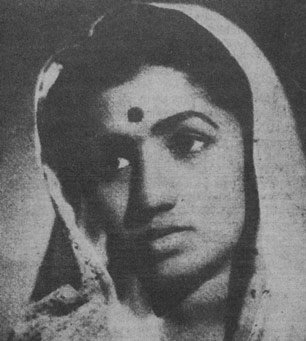

Song: Khuda – E- Bartar Teri Zameen Par
Film: Taj Mahal
Year: 1963
Composer: Roshan
Lyricist: Sahir Ludhiyanvi
Khuda – e- bartar teri zameen par zameen ki khatir yeh jung kyoon hai?
Har ek fatah-o-zafar ke daaman pe khoon-e-insaan ka rang kyoon hai?
(O Lord Almighty, on your land, why is this war raging to win a land?
Why has every conqueror’s victory always been tainted with stains of human blood?)
Zameen bhi teri, hain hum bhi tere to milkiyat ka sawal kya hai?
Yeh qatl-o-khoon ka rivaaj kyuun hai, yeh rasm-e-jang-o-jadaal kyuun hai?
Jinhein talab hai jahan bhar ki, unhiin ka dil itna tang kyuun hai?
(When everything is yours, then where is the question of our owning and conquering?
Why is then this beastly tradition of killing and butchering through mindless wars?
Those who want to rule this vast world, how come their hearts are so narrow?)
Such beautiful, thought- provoking words- and so very apt for today’s world scene. When Sahir Ludhiyanvi wrote these lyrics in chaste Urdu for a film song in Taj Mahal (1963), he couldn’t have imagined that more than half a century later they would still remain socio-politically relevant. But that is the true sign of great artistry – its timelessness.
Composed by the redoubtable Roshan and rendered by the one and only Lata Mangeshkar, Khuda-e-bartar ranks as one exceptionally moving and deeply meaningful prayer in Hindi film music. Musically it is a simple composition; a kind of straight heart-to-heart talk but it is mainly the lyrics, which makes it a great song. It reminds us of the times when film songs maturely and sensitively spoke of sociopolitical issues without sounding pompous and phony.
Sahir Ludhiyanvi is a revered name, both in Hindi film music and in Urdu literature. Talkiyaan- his collection of Urdu poetry is an acclaimed masterpiece and to match that he came up with many such literary gems through an unlikely medium of Hindi film songs. His leftist reformist political thinking always surfaced in many of his songs but it did so by showing genuine human emotions, not just as propaganda.
Seldom has any song depicted anti-war sentiments so succinctly. After highlighting the futility of any war’s purpose and the horrifying destruction it brings up in its wake, the prayer urges the God to show the light of good sense to the ones whom He has granted power and strength, by saying:
Jinhein ataa kee hai tuune taaqat, unhein hidaayat ki roshani de;
Next it asks a very disturbing question about these powerful war-mongers,
Saron mein kibr-o-ghurur kyuun hai, dilon ke sheeshe pe zang kyuun hai?
(Why is their mind so clouded by arrogance? Why is the mirror of their hearts so rusty?)
Why indeed!
PS: Archisman Mozumder adds:
While this appears to be an out and out 'Sahir-song', Roshan's clever use of raag Miyan Ki Todi is a master-stroke. This is a raag is poignant and introspecting in nature and is generally rendered in the morning. Morning is when the armies commence the mindless battle again and on the rear portion of the same ground, the near and dear ones of the dead soldiers, grieve in front of burning pyres.
This heart-rending dichotomy is showcased beautifully by the choice of this raag. Also, how beautifully does the melancholic passages of the cello (a western instrument) sear our senses!
Our Film Music has been a hotbed of innovation and fusion, given the incandescent talent that descended onto Bombay from all over the subcontinent (and the nature of music-creation that required sustained collaboration).
It is high time that we cast aside our 'B V Keskar mentality' and recognise our film music as an evolved art-form.
Author info is not available!